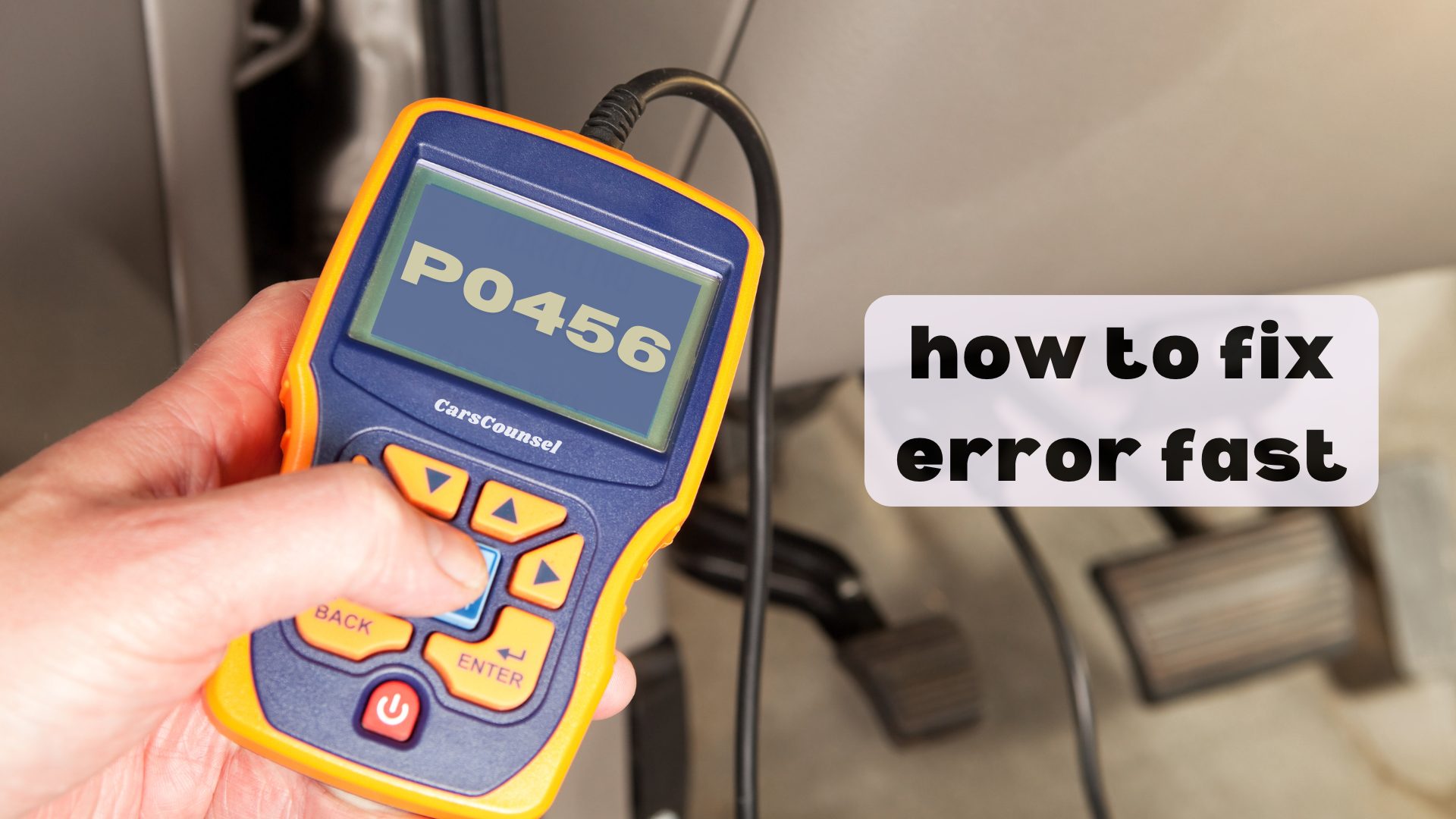You might not know that your vehicle’s Evaporative Emission Control (EVAP) system is constantly monitoring for leaks, even when you’re not driving. That’s why it’s alarming when the P0456 code pops up, indicating a very small leak in the system.
This tiny leak can lead to decreased fuel efficiency and performance issues, and if left unchecked, can trigger the check engine light and even cause your vehicle to fail an emissions test. But what’s causing this leak, and how can you fix it before it becomes a bigger problem?

Quick Navigation
Key Takeaways
- A P0456 code indicates a very small leak in the Evaporative Emission Control (EVAP) system, affecting fuel efficiency and performance.
- Common causes of EVAP system leaks include a loose or damaged fuel cap, damaged or loose hoses, and faulty seals or fuel caps.
- Pressure testing techniques, such as a leak-down test or smoke test, can help identify the source of the leak.
- If left unaddressed, a P0456 code can trigger the check engine light, cause the vehicle to fail an emissions test, and lead to performance issues.
- Repair costs can range from $150 to $650, depending on the parts and labor required, and prompt repair is essential to avoid further complications and costs.
Code P0456 Description and Symptoms
When your vehicle’s onboard diagnostic system detects a very small leak in the Evaporative Emission Control (EVAP) system, it triggers the P0456 code.
This trouble code indicates that there’s a tiny leak in the EVAP system, which captures and stores fuel vapors from the fuel tank to prevent atmospheric release.
As a result, you may experience decreased fuel efficiency and performance issues.
If left unaddressed, the P0456 code can trigger the check engine light and cause your vehicle to fail an emissions test.
Addressing this issue promptly is essential to maintaining your vehicle’s fuel efficiency and guaranteeing its passing emissions testing.
Common Causes of EVAP System Leaks
Since a small leak in the EVAP system has been detected, it’s crucial to identify the root cause to facilitate a timely and effective repair.
You’ll need to inspect the Fuel Cap to verify it’s tight and free of damage. A loose or damaged Fuel Cap can trigger the P0456 code, so it’s essential to check it first.
Additionally, perform a Hose Inspection to identify any cracks, cuts, or signs of wear. Damaged or loose hoses can also cause a small leak in the EVAP system.
Identifying the Source of the Leak
How do you pinpoint the source of the leak in the EVAP system?
You’ll need to employ leak detection methods to identify the culprit. Pressure testing techniques are essential in this process.
Begin by pressurizing the EVAP system to the recommended specification. Then, use a leak-down test kit to isolate the leak.
You can also use a smoke test to visualize the leak. This involves filling the system with a pressurized smoke solution, which will exit through the leak point, making it easier to spot.
Additionally, inspect the EVAP system’s components, such as hoses, seals, and fuel caps, for signs of damage or wear.
When the P0456 Code Is Detected
Upon detection of the P0456 code, it’s essential to understand the circumstances surrounding its triggering.
This code is detected when the EVAP control system has a very small leak, which can be triggered by a loose fuel filler cap or other issues within the system.
The scenarios where the P0456 code is typically detected are:
- During routine maintenance or inspections, when the EVAP system is tested for leaks.
- During emissions testing, when the vehicle’s emissions are measured.
- When the vehicle is in operation, and the onboard diagnostics (OBD) system detects a leak in the EVAP system.
- When a leak detection pump is used to test the EVAP system for leaks.
Understanding when the code is detected can help you identify the source of the leak and take necessary steps to repair it.
Effects on Vehicle Performance and Emissions
When a P0456 code is detected, it’s not just a matter of a minor issue – it can have a significant impact on your vehicle’s performance and emissions.
You may notice a decrease in fuel efficiency, which can lead to increased fuel costs and a larger carbon footprint. Additionally, performance issues may arise, such as a rough idle, decreased power, or stalling.
These problems can be frustrating and affect your daily driving experience. The EVAP system leak can also cause your vehicle to fail an emissions test, which can lead to further complications and costs.
It’s essential to address the P0456 code promptly to avoid these negative effects on your vehicle’s performance and emissions.
Repair Costs and Estimated Time
Your vehicle’s repair costs for the P0456 code can vary widely, depending on the specific cause of the leak and the parts needed to fix it.
The cost of diagnosing the leak can range from $50 to $150, depending on the complexity of the issue and the shop’s rates.
1. Leak Diagnosis:
2. Repair Estimates:
Based on the diagnosis, your mechanic will provide a repair estimate, which can range from $100 to $500, depending on the parts and labor required.
3. Parts and Labor:
The cost of replacement parts, such as hoses, seals, or fuel caps, will vary depending on your vehicle’s make and model, as well as the labor costs for the repair.
4. Total Repair Cost:
The total repair cost will depend on the extent of the repair and the shop’s rates, but you can expect to pay between $150 and $650 to fix the P0456 code.
Troubleshooting and Inspection Steps
To identify the source of the P0456 code, you’ll need to perform a thorough inspection and troubleshooting process.
Start by checking the fuel cap and fuel filler neck for any signs of damage or wear.
Inspect the EVAP system hoses, connections, and seals for cracks, cuts, or looseness.
Use a smoke test or leak-down test to detect the source of the very small leak.
Perform a system inspection to verify that all components are properly connected and functioning as intended.
Pay close attention to the vent valve, fuel tank pressure sensor, and purge valve, as these are common areas where leaks occur.
Preventing Future EVAP System Leaks
One key aspect of preventing future EVAP system leaks is to maintain a habit of regularly inspecting and checking the system’s components.
This includes fuel cap maintenance, which is essential in leak prevention.
Here’s a list of tips to help you prevent future EVAP system leaks:
- Regularly inspect the fuel cap: Check the fuel cap for signs of wear, damage, or looseness, and replace it if necessary.
- Check the EVAP hoses and connections: Inspect the hoses and connections for cracks, damage, or signs of wear, and replace them if needed.
- Monitor the EVAP system’s performance: Keep an eye on the system’s performance and address any issues promptly to prevent small leaks from becoming major problems.
- Address any warning signs: If you notice any warning signs, such as a loose fuel cap or a hissing sound, address them immediately to prevent a small leak from becoming a larger issue.
More OBD-II Codes
Frequently Asked Questions
Can a Small EVAP Leak Cause Engine Performance Issues?
You’ll likely notice decreased fuel efficiency due to the small EVAP leak, but it’s less probable to cause significant engine performance issues; however, finding the leak location is vital to prevent further problems, so inspect the fuel cap, hoses, and seals thoroughly.
Will a P0456 Code Always Trigger the Check Engine Light?
You’ll find that a P0456 code doesn’t always trigger the check engine light, as light sensitivity varies by vehicle and manufacturer; however, it’s likely to illuminate if the leak is significant enough to impact emissions or fuel efficiency.
Can I Drive My Vehicle With a P0456 Code Safely?
You can drive your vehicle with a P0456 code, but it’s not recommended as it may decrease fuel efficiency and compromise vehicle reliability, potentially leading to further damage and costly repairs.
Will a P0456 Code Cause My Vehicle to Fail an Emissions Test?
You’ll likely fail an emissions test with a P0456 code, as it indicates a very small leak in the EVAP system, triggering increased emissions; however, you might be eligible for test exemptions or emission waivers, depending on your location and local regulations.
Can a Faulty OBD-II Scanner Detect a P0456 Code?
You’re wondering if a faulty OBD-II scanner can detect a P0456 code, and the answer is yes, it’s possible, but be cautious of scanner limitations that may lead to faulty readings, misdiagnoses, or inaccurate code detection.
Conclusion
As you address the P0456 code, bear in mind that a small leak can have a big impact, like a tiny crack in a dam that eventually leads to a flood. In fact, according to the EPA, a single gallon of gasoline can evaporate up to 147,000 gallons of water, highlighting the importance of prompt repair. By identifying and fixing the source of the leak, you’ll not only maintain fuel efficiency and emissions compliance but also prevent a small issue from becoming a major problem.

